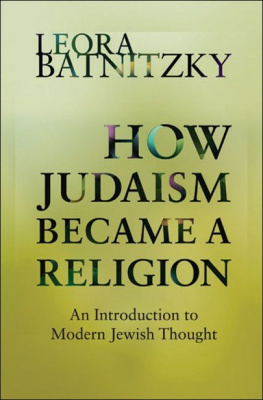Bashevkin - Sin.a.gogue: sin and failure in Jewish thought
Here you can read online Bashevkin - Sin.a.gogue: sin and failure in Jewish thought full text of the book (entire story) in english for free. Download pdf and epub, get meaning, cover and reviews about this ebook. year: 2018, publisher: Cherry Orchard Books, genre: Religion. Description of the work, (preface) as well as reviews are available. Best literature library LitArk.com created for fans of good reading and offers a wide selection of genres:
Romance novel
Science fiction
Adventure
Detective
Science
History
Home and family
Prose
Art
Politics
Computer
Non-fiction
Religion
Business
Children
Humor
Choose a favorite category and find really read worthwhile books. Enjoy immersion in the world of imagination, feel the emotions of the characters or learn something new for yourself, make an fascinating discovery.
Sin.a.gogue: sin and failure in Jewish thought: summary, description and annotation
We offer to read an annotation, description, summary or preface (depends on what the author of the book "Sin.a.gogue: sin and failure in Jewish thought" wrote himself). If you haven't found the necessary information about the book — write in the comments, we will try to find it.
Bashevkin: author's other books
Who wrote Sin.a.gogue: sin and failure in Jewish thought? Find out the surname, the name of the author of the book and a list of all author's works by series.
Sin.a.gogue: sin and failure in Jewish thought — read online for free the complete book (whole text) full work
Below is the text of the book, divided by pages. System saving the place of the last page read, allows you to conveniently read the book "Sin.a.gogue: sin and failure in Jewish thought" online for free, without having to search again every time where you left off. Put a bookmark, and you can go to the page where you finished reading at any time.
Font size:
Interval:
Bookmark:


Library of Congress Cataloging-in-Publication Data
Names: Bashevkin, David, 1985- author.
Title: Sin.a.gogue : sin and failure in Jewish thought / David Bashevkin.
Description: Boston : Cherry Orchard Books, 2019. | Includes bibliographical references and index.
Identifiers: LCCN 2018023281 (print) | LCCN 2018023521 (ebook) | ISBN 9781618117984 (ebook) | ISBN 9781618117960 (hardcover : alk. paper) | ISBN 9781618117977 (pbk. : alk. paper)
Subjects: LCSH: Sin--Judaism. | Repentance--Judaism.
Classification: LCC BM630 (ebook) | LCC BM630 .B38 2018 (print) | DDC 296.3/2--dc23
LC record available at https://lccn.loc.gov/2018023281
ISBN 9781618117960 (hardcover)
ISBN 9781618117984 (ebook)
ISBN 9781618117977 (paperback)
Academic Studies Press, 2019
Book design by Lapiz Digital Services
On the cover: photograph by Menahem Kahana, reproduced by the authors permission.
Published by Cherry Orchard Books, imprint of Academic Studies Press.
28 Montfern Avenue
Brighton, MA 02135, USA
www.academicstudiespress.com
CONTENTS
A WORD ABOUT THE COVER
The photograph on the cover was taken by Menachem Kahana, an Israeli photographer who was given unprecedented access to the Israeli Haredi community. His photographs were later published in a volume called Haredim (Tel Aviv, Israel: Eretz Israel Museum, 2009).
This photograph was taken from behind the Hasidic Rebbe of Belz as he was conducting a ceremonial meal known as a tisch . Next to the back of the Rebbe is his trusted assistant, known as a shamish . Flanked on both sides are hundreds of Hasidim watching carefully at the Rebbes moves and utterances.
But thats not why I love the photograph.
Underneath the table where the Rebbe sits is a lone child, patiently and quietly hiding and listening to the Rebbe. If you look at the picture quickly, you may not even notice the child underneath the table. I like to think that each section of the photograph depicts a different element of the Jewish community. You have your leader, the Rebbe. Each leader has his right-hand men, the proverbial number two. And of course, the followers who anxiously wait for direction. But the person that interests me most is the one who is not at the table. The child hiding underneath. The people on the periphery. Such people inspire me, and I think this picture aptly portrays many of the feelings this book will hopefully describe. Its not enough to connect with leaders and their loyalistsyou also need to check who is not at the table.

FOREWORD
Lets face it, most modern Jews have a problem with sin. Its not that we dont do it, often even enjoy it, and also repent for doing it, but we dont like to talk about it much, we dont like our Judaism to be infused with talk of sin. From Modern Orthodoxy to Reform, Reconstructionism, and Renewal, we like our Judaism positive. Of course, Scripture basically begins with sin and failure and to one degree or another, as David Hartman once said, the Hebrew Bible is a book of Jewish failure. We only get to the third chapter of Genesis when Adam and Eve sin against God. In chapter four, Cain kills his brother Abel, in chapter six it seems like all of humanity is mired in sin except Noah, and in chapter eleven the people rebel and build the Tower of Babel. Then of course, Abraham lies to save his own skin, Jacob lies to get his fathers blessing, Josephs brothers throw him in a pit and sell him down to Egypt, and were still in Genesis!
The kabbalist Isaac Luria reads creation as an act of divine failure, of rupture and devastation that is our world. Works like the medieval Sefer Hasidim and the dark world of the Zohar are obsessed with sin, failure, and evil, and the modern Musar Movements focus on tikun ha-midot (repairing ones ethical traits) impels a state of failure that pervades its view of human nature.
The reasons modern Jews are made uncomfortable with sin and failure are varied. In part it may be an attempt to distinguish itself from Christianity, in part simply the produce of a world that chooses to focus on light instead of darkness, part of the American ethos of morning in America. In any case, what David Bashevkin shows us in this wonderful book is that sin and failure are not only embedded in the Jewish tradition but that the tradition has fascinating and compelling things to say about the sinfulness of the Jews, and human beings in general, and he examines the ways such insights can contribute to contemporary analyses of questions of human vulnerability and failure in our overly psychologized society.
By weaving together classical Judaic sources that exhibit Bashevkins broad and deep knowledge of the tradition with contemporary discussions from ethicists, scientists, social scientists, literary figures, and philosophers, Bashevkin brings alive material the secular world had no access to, and material the yeshiva world did not know existed. There is something daring in equaling the playing field in comparing a comment by George Orwell to the Hazon Ish, but that is precisely Bashevkins point: to humanize lionized figures in order to truly enter the world of struggle and failure that each experienced and continued to struggle with as part of their human greatness. This is an exercise in intellectual and spiritual war against the genre of hagiography, the fantasized depiction of great figures used so often today to shield such figures from the sins and failures that helped make them great.
When we look more closely, argues Bashevkin, we find that when we give voice to many Jewish heroes, often through correspondence, what we find is that they undermine their own sense of grandeur and are more concerned with confronting their weaknesses than overlooking them. There are certain obvious cases such as the Hasidic master Nahman of Bratslav, whose homiletic writings are replete with allusions to his own desires and failures. But even in more temperate figures, Bashevkin shows us in intricate detail how they never shied away from the challenges of their humanness and engaged deeply with questions of sin and failure in their own lives.
This book is a synthetic exercise of modern discomfort with sin and traditional engagements with the challenges of being human that are too often whitewashed because of our desire to see our heroes as figures not burdened by the same desires as we are. Or, because we want our religion to be uplifting and not depressing. In addition, Bashevkins comparative perspective enables us to narrow the divide that separates one religious tradition from another, and to see them all as exemplars of the sheer passion and desire to live with the fragility of human existence. This book will make some readers uncomfortable, some because of its iconoclastic temperament, and some because it all strikes too close to the broken human heart we all share. But there is little doubt that Sin-a-gogue: Sin and Failure in Jewish Thought is a work of deep Judaic learning and creative and refreshing modern interpretation. Human. All-too-human.
Shaul Magid
Hanover, New Hampshire
INTRODUCTION: THE STORIES WE TELL
To pay for my fathers funeral
I borrowed money from people
He already owed money to.
One called him a nobody.
No, I said, he was a failure.
You cant remember
A nobodys name, thats why
Font size:
Interval:
Bookmark:
Similar books «Sin.a.gogue: sin and failure in Jewish thought»
Look at similar books to Sin.a.gogue: sin and failure in Jewish thought. We have selected literature similar in name and meaning in the hope of providing readers with more options to find new, interesting, not yet read works.
Discussion, reviews of the book Sin.a.gogue: sin and failure in Jewish thought and just readers' own opinions. Leave your comments, write what you think about the work, its meaning or the main characters. Specify what exactly you liked and what you didn't like, and why you think so.







